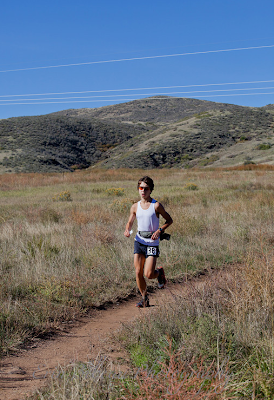While I like to indulge in 50 and 100 mile races, there’s
nothing like a trail marathon in brisk fall weather – the frosty start, leaves
turning gold and orange, and a pair of burning lungs.
Two weeks before the Blue Sky Trail Marathon, I still had
yet to run more than 4 miles at a time. After bruising my medial collateral
ligament in the Leadville 100, I had barely been able to jog more than a few
minutes before my right knee ached. My recovery was nevertheless rapid thanks
to the amazing work of physical therapist Steve Wade at CSU, but I entered this
race with zero conditioning, unless you consider one 40-mile week adequate preparation
for a marathon.
The Blue Sky Trail Marathon begins with a deceptively easy
two-mile warmup on the groomed Soderberg Trail before turning straight up
Towers road. At that point a lead pack tore away with Corey Hanson and a few
other runners, among them eventual winner Kyle O’Brien.
When we turned off Towers and onto Herrington the race took
on a very different character, with six or so guys really hitting the dirt,
skidding around switchbacks and muscling up awkwardly-sloped trails. And then
the downhill. It’s impossible to describe the exhilaration and fear that comes
from running fast down a technical trail. Stout trail is full of loose rock and
boulders wedged into the hillside, and it’s impossible not to feel a little
afraid of wiping out bounding downhill.
More or less falling down Stout Trail (photo by Eric Lee).
Soderberg trail gives you just a moment of time to collect
yourself and mentally prepare for the meat of the race – the out-and-back on
the Blue Sky trail. I pulled into the lead for a brief moment on the Blue Sky
trail before Kyle rocketed into the lead. I caught him on the downhill into the
Indian Summer North aid station; he stopped and I rolled through, and from
there I assumed the lead up Indian Summer. It was here that things started to
hurt, and I realized that I was going to have to work insanely hard to hold on
to it.
Descending into Indian Summer North (photo by Erin Bibeau).
Pausing at Indian Summer South for water, I ceded some of my
lead before finally losing it at the top of Devil’s Backbone. Within a few
moments, Kyle had seemingly floated over the jagged slickrock and boulders, and
here I was stranded in second. The 3-mile section around the Backbone gives you
no relief, with very few runnable stretches and plenty of awkwardly-slanted
routes. Slog it out and hold on to second for now, I thought.
I got a rush descending the Backbone to Indian Summer South
as I saw Kyle in the distance, but by the time I hit the Indian Summer climb I
could feel myself running out of steam, again. I popped a gel on the way up and
said a prayer to the running gods, and by the time I reached the descent into
Indian Summer North I was able to open up my stride and regain my composure.
Gettin' that gel packet ready for disposal (photo by Erin Bibeau).
Kyle had a lot of time on me, and with 4-ish miles left I
was going to have to pull a rabbit out of a hat. As I was nearing the top of
the climb out of Indian Summer North I could see Justin Liddle leaving the aid
station looking fresh. I attacked the hairpin turns and boulders on Blue Sky
despite the burning in my legs.
I started sprinting when I saw the finish line
filter into view through the chainlink fence and the leaves of the locus trees.
Second, 3:26:12 – faster than last year, and beyond my expectations given the
recent bodywreck at Leadville.
What's next? I'm going to focus on some strength training at the expense of mileage until the end of the year, when I'll transition to high-mileage training once again. I'll be doing the Sean O'Brien 50 mile on February 1st, the Badger Mountain 100 on March 28th, Leadville in August. I'll be taking my preliminary exams in May, so I'm not sure I'll be able to swing Quad Rock, but I'd love to do the Wyoming Marathon again and take a crack at the course record (I wasn't far away when I did it in 2012). As for the rest, who knows, sometimes it's fun to enter races at the last minute.


